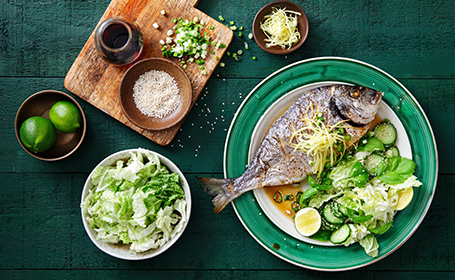
How can a Mediterranean diet combat joint pain?
Studies by The National Library of Medicine show that sticking to a Mediterranean diet reduces joint pain in people with Rheumatoid Arthritis. Arti Dhokia, Advanced Dietitian and Dietetic Lead at Circle Rehabilitation Birmingham, discusses The Mediterranean Diet and whether it helps combat joint pain and weight issues.
How does weight affect arthritis pain?
When considering the relationship between eating and joint pain, a healthy weight is first and foremost the most effective means of reducing joint pain. This is because excess weight puts stress and strain on weight-bearing joints, such as your knees and ankles. Being overweight can also result in inflammatory problems, which often lead to significant joint swelling and pain.
If you are overweight, losing just 10% of your body weight can reduce pressure on your joints, easing pain and improving mobility as a result.
Begin your weight loss journey by setting yourself small, achievable goals with the help of a dietitian. This will show you that it’s not about cutting out the foods you enjoy, but finding the right balance for you.
What is The Mediterranean Diet?
The Mediterranean Diet incorporates vital components needed to maintain a healthy diet and weight, which helps tackle rheumatoid arthritis joint pain.
Those suffering from arthritis and joint pain often complain of tiredness and fatigue... Eating iron-rich foods as part of your regular diet can help.
Iron
An arthritis flare can reduce iron absorption. This can lead to anaemia (when your body lacks red blood cells to transport oxygen around your body). Those suffering from arthritis and joint pain often complain of tiredness and fatigue. This can be worsened by anaemia.
Eating iron-rich foods as part of your regular diet can help. Iron is better absorbed with vitamin C. Try having a portion of fruit, vegetables or a glass of orange juice alongside iron-containing foods. Lean red meat, eggs, poultry, beans and lentils, green leafy vegetables and fortified breakfast cereals all contain iron.
There is no scientific evidence that reducing red meat or cutting it out will reduce joint pain. So, if it's something you enjoy, include lean red meat in your meals one to two times a week as part of a balanced diet.
Fat
People who suffer from rheumatoid arthritis have a higher risk of developing heart disease than those who do not.
You can reduce your risk of heart disease by managing your cholesterol.
Cholesterol is a type of fatty substance found in your blood. Reducing your intake of food containing the bad type of cholesterol (also known as low-density lipoprotein) may help alleviate joint pain and inflammation.
Bad cholesterol is usually found in animal fats, which are known as saturated fats. Replacing these saturated fats (butter, olive oil, fatty meat and palm oil) with healthy alternatives (fruit salad, grilled chicken breast, low-fat cheese), will not only reduce your bad cholesterol levels, but also increase your good cholesterol levels (also known as high- density lipoprotein).
For more information on how to make healthier fat choices, speak to a dietitian.
Mackerel, sardines, salmon, herring and snapper are full of omega-3 polyunsaturated fats... which have been proven to reduce joint pain.
Fish oils
Mackerel, sardines, salmon, herring and snapper are full of omega-3 polyunsaturated fats. Omega-3 polyunsaturated fats have been proven to reduce joint pain. Aim for two portions of oily fish a week.
If you don’t like the taste of oily fish (or would rather take a fish oil supplement) high-dose fish oil supplements have been shown to reduce symptoms of rheumatoid arthritis. These can reduce morning stiffness, joint swelling and joint pain.
Fish oil supplements should have 500-1000mg of EPA and DHA (omega-3 fats) per capsule. If you don’t feel an improvement straight away, don’t give up! It can take up to three months for them to take effect.
Don’t forget, speak to your doctor before taking any new supplements.
Calcium and Vitamin D
Calcium is important for building and protecting strong bones, making it an important substance for people with joint pain.
Try including at least three portions of calcium containing foods in your day, aiming for low-fat varieties to reduce your intake of saturated fat.
Calcium can be found in dairy products, including: low-fat milk, yoghurt and cheese. It is also in green leafy vegetables, soya products with added calcium, almonds and some fish (such as sardines and pilchards).
Calcium and vitamin D work together to protect your bones—calcium helps build and maintain bones, while vitamin D helps your body effectively absorb calcium.
Sun breaking through the clouds
If you’re having enough calcium and not enough Vitamin D, your calcium intake might go to waste. We get our Vitamin D from the sun, so it’s a good idea to take a supplement in the winter months.
Following The Mediterranean Diet could help you incorporate these important components into your everyday meal plans.
If you’re suffering from joint pain, we have many joint pain specialists who can help. Find one today.
Tags
How do I book an appointment?
If you're concerned about symptoms you're experiencing or require further information on this subject, talk to a GP or see an expert consultant at your local Circle Hospital.